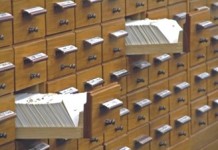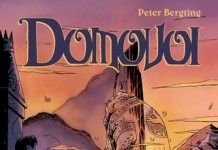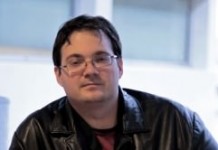This is part 3 of a 5 part interview with 84 year old Ohio author Jack Matthews. See also: Part 1 ,Part 2, Part 4, Part 5. Also: Jack Matthews (an introduction), Jack Matthews: The Art and Sport of Book Collecting and On Choosing the Right Name for a story character by Jack Matthews.
What do you do or where do you go to get away from writing and literature?
I collect old and rare books. When I was younger, I jogged, but quit after a bone spur in my heel talked me into it. And I’ve always loved to drive — years ago, I calculated that at that time I had actually driven over a million miles in cars.
One of your bios mention that you and your wife used to store your book collection in an old saloon, "bought for that purpose and located in a small southeastern Ohio mining town." What’s the story behind that? Do you still own the saloon?
We’ve just, in the past month, sold the old place on a land contract. Before that, I sold the books in the store (about 10 to 15 thousand at each sale) to Mike Riordan, a friend from Hell, Michigan (yep, that’s where he was from). He’s the retired captain of a nuclear sub who’s now crazy about the book game; the last I heard, he had accumulated over 300,000 of them. (He and his wife Janet have moved to Colorado.)
I realize that your wife is a book nut too, but has she ever suggested getting rid of half of the books in your house to free up space?
My dear wife has the typical housekeeper’s passion for cleanliness & order, so she’s occasionally exasperated by my own passion for scooping up books. Her own collecting is rather passive; but she has a special interest in children’s books & Gone with the Wind stuff. (Ed. note: He answers the question more fully in a recent radio interview (mp3)) .
You extol book collecting as a kind of recreational activity, almost like gambling. Aside from the occasional wacko, are book collectors generally sane and financially responsible people?
No, I think we’re all a bit unbalanced — but happily so. It’s a passion that has no limits; who could ask for better?
Can you talk about a recent book acquisition you are proud of?
Not a specific book, but I’ve been gathering up mint 1st editions of Christopher Morley, a vastly underrated author in my opinion, so he can be collected inexpensively, which is my favorite price…
In your essay, Collecting by Chance, you say, "the psychological rewards of aleatory choice are considerable." Explain. Many of your inspirations and literary interests come from books you’ve encountered during your book collecting in Ohio. But if you lived in Texas or Nevada, wouldn’t you end up coming across totally different books during your book treks?
I’d still find a lot of books to go through. I can’t get stopped. Earlier today, I hit some nearby thrift stores & came back with 16 books. Nothing, alas, to light up the world, but they’re books, after all. (We have a pole barn to store the little rascals in.)
Let me ask an indelicate question. You are 84 and own lots of strange and remarkable books — many of which you will never have time to read. Does this knowledge depress you?
No, I’m not depressed by the fact. I take pleasure in living amidst so many microcosms, each one of which bears witness to its own slice of the world. Without such amplitude, the spirit would wither and desiccate like a demoralized walnut.
I like to think of a personal collection as the creation of one’s own, symbolically charged environment. In one of my books I bounce off Candide’s famous conclusion, pointing out that a personal library is an intellectual’s garden. What could we cultivate that is more interesting, meaningful and telling?
In COLLECTING RARE BOOKS FOR PLEASURE AND PROFIT (1977), you wrote, "books possess individual personalities; they possess interiors much like the interiors of human beings, and every bit as varied… Multiply this inner amplitude by the thousand and more volumes that are required for the modest beginnings of a personal library, and you can see what rich cacophonies and babbles, or what splendid symphonies and chamber music can result." With the abundance of titles being published, is there a danger of books bringing too much cacophony? When searching through stacks of quantity, isn’t it natural for people to seek well-known brands denoting quality?
No danger in cacophony. We’re pathetically one & limited & can absorb all the varieties of our environment according to what we need. Even without thinking on’t.
On the surface, BOOKING IN THE HEARTLAND (1986) is a series of yarns about the strange books you have encountered during book collecting. But you read these books as closely as scholars might read Shakespeare or Henry James. Yet, at the same time you seem to be laughing at the same books you are analyzing; is your goal in writing these essays to encourage others to read these very books?
They’re all testimonials, of a sort. I once told a reporter (doing a piece on our old defunct saloon we’d converted into a sort of "bookstore") that I felt like a missionary to the 20th century. Now, if rumors are correct, it’s the 21st. We all bear witness, no matter who we are, or when & where & how.
As for my “laughing at them”: laughter is part of how I try to cope with the world, & it has to do with language, which is intrinsically ironic. That is, every word denotes a type, whereas no two of its tokens are alike. We gather these great heterogeneous multiplicities of tokens together into a word, but the members of the population so seldom match the image we have of the type that the disparity is almost always, & to some extent, ironic. Funny.
Given that many bibliophiles engage in the sport of book collecting, should authors make books with an eye towards their collectibility?
I’m not sure that any “should”— but it’s possible that some think this way. A beautifully designed book is a work of art, after all; but perhaps such elegance should be confined to a small percentage of highly sophisticated, "literary" works or beautifully designed illustrated books.
Apart from your essays on book collecting, you haven’t written any memoirs or autobiographical essays. Can a case be made for having more "creative fiction" and less "creative nonfiction"?
My bibliophilic essays teem with personal adventures and are in this sense, fragments of memoirs .. . And, yes, I like memoirs — notebooks, journals, diaries — all sorts of personal testimony when one isn’t consciously inventing, but inventing, anyway, for the memory is a story teller — held together in Christopher Morley’s grand phrase — by "cobweb analogies".
Coming Next: Jack Matthews Interview Part 4: Projects Past and Present

































